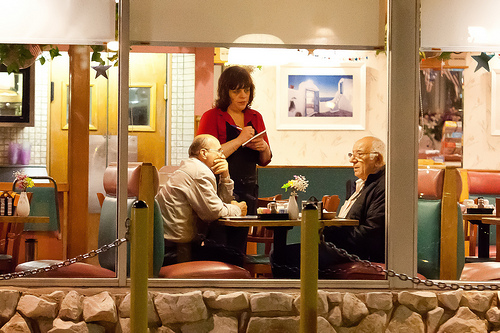When Luis Deleon feels sick, he still has to go into work as a cook at a Chicago restaurant.

“There’s been a bunch of different times where I had to work when I was sick and I could have really used a day off, but that would have affected my paycheck,” Deleon said.
The 27-year-old is also a student at Washburne Culinary School and lives at home with his parents. He works part-time at the restaurant to pay for groceries, school bills and rent.
Deleon said taking an unpaid day off is just not an option for him.
“That $60 for one day—I need it,” he said.
But Deleon may soon be able to stay home if he’s sick and still get paid.
State Sen. Martin Sandoval (D-12th district) introduced legislation in January that would mandate some paid sick days for all employees in Illinois, regardless of whether the employees work full or part-time.
The bill, SB128, would provide all Illinois workers with one paid day of leave for every six weeks they work, with no more than seven paid sick days for the entire year. And, if an employee is terminated, the employer would not be required to pay the employee for their unused sick days.
A vote is expected to be taken on the measure in the Senate Labor Committee meeting today, and the senator said he is confident it will move to the full Senate.
“I have every intention of calling the bill and Senate Democrats can either support issues affecting working families and women, or they can turn their backs on them,” Sandoval said.
But state Sen. Linda Holmes (D-42nd district), the vice-chairwoman of the labor committee, said she would oppose the bill if it came to a vote.
“I, personally, was a small business owner for 24 years prior to becoming a senator,” she said.
Holmes ran a remodeling company for those 24 years and said that during that time, she employed no part-time employees and there was no written policy regarding sick time leave.
“When you run a small business, it’s a little more family-like,” Holmes said. “If an employee had a sick child or they were sick–if they were a good employee, you paid them because you wanted to keep those employees.”
The Restaurant Opportunities Centers United (ROC) is an organization that wants better standards for restaurant workers and supports Senator Sandoval’s bill.
Restaurant Opportunities Center conducted a report in September that looked at the number of servers who still come in to work, despite being sick. ROC surveyed 4,323 restaurant workers nationwide, the largest national survey sample of restaurant workers ever conducted, according to the report.
Over 87 percent of those surveyed reported not receiving paid sick days. And more than 63 percent reported cooking and serving food while sick.
Veronica Avila is the Chicago coordinator for Restaurant Opportunities Center United.
Avila said the data from the Restaurant Opportunities Center report only strengthens Senator Sandoval’s bill.
“Now I think we can put a number to how widespread the problem was,” Avila said. “Where before, we knew that people were going into work sick…was something that was common, but I don’t think we knew how common it was.”
Avila said the report also found that over 60 percent of those interviewed had been in the restaurant industry for more than 10 years.
“It’s definitely a profession, and it’s not a transient work force. These are people that are supporting their families, that have sick kids, so we want to make it a job that is one where people can get benefits as well,” she said.
San Francisco is one of the only U.S. cities with a law mandating sick days. Effective in 2007, all employers must provide paid sick leave to each employee—including temporary and part-time—who performs work in San Francisco.
As of December 2010, San Francisco’s employment rate was comparable to that of surrounding counties that did not pass the mandate, according to data from the California Employment Development Department.
Luis Deleon said he hopes the bill gets passed, because this is an issue that affects those who come into the restaurant as well as those who work there.
“People who eat at a restaurant are getting affected by the people who work there. I mean, you’re not paying a $50 tab to get sick,” he said.
Deleon also said he thinks being able to take time off when you’re sick, and knowing you will not lose your job, is one of the basic rights that should be afforded to any worker.
“If you’re sick, you want to get well. You want to get taken care of,” he said.













Be First to Comment